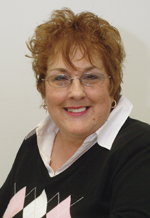Cell Mates
Rural residents everywhere relate to the cellular connection
disconnection
by
Margo Oxendine,
Contributing Writer
|

Margo Oxendine
|
Can we talk? About rural phones?
Those who live in or near a city simply do not understand.
But chances are, if you�re reading this magazine, you�re well aware of the
quirks and quandaries of country calling.
First thing a visitor or new rural resident learns is
this: All cell phone providers are not the same. Around here, if you have
AT&T or Sprint or really, anything but Verizon, you can�t rely on cell phone
service.
Case in point: I whipped off the highway and turned into
my driveway last week, only to find a woman in a Mercedes parked there. In
answer to my questioning look, she smiled and shrugged. �Sorry,� she said,
�This is the only place I can get my cell phone to work.� Being the truly
helpful rural dweller I am, I told her to feel free to consider my driveway
her �call center� any time.
My own cell phone is never turned on unless I am
traveling, or need to call ahead for to-go food while running errands around
town.
My cell phone cannot be used for texting, at least not to
my knowledge. It does take photos, but I have no idea how that works.
Lurking somewhere in its innards is a photo of the inside of my purse. I
took it quite by accident, and have no idea what to do with it.
Folks in Bath County have had to learn to live with hoots
and hollers and guffaws from urban visitors when they spy our phone books.
Forget Superman; a toddler could tear our little 8x5 phone book into
tatters.
Bath County residents are served by no fewer than, I
think, five different phone companies. If you live in Millboro, chances are
you must make a long-distance call to reach McClung, just a few miles down
the road.
It wasn�t too long ago that many folks here had no phone
service at all. When I visited Mrs. Brinkley�s farm as a kid, she had a big
brass bell outside that she�d clang if she needed help from the neighbors.
When I was in high school, those of us in Hot, Warm and
Healing Springs only had to dial the last four digits of the 839- exchange.
Now, we must dial all seven. Still, we�re better off than my friends in
Baltimore. They must dial an area code to reach a phone two doors down the
hall.
Yesterday, I called a friend and got her voice mail. I
didn�t leave a message. Two hours later, she called me back, having seen my
number on her caller ID. Trouble was, by then I�d forgotten why I called. We
had a 20-minute conversation, nonetheless.
In my opinion caller ID is the most wonderful invention
since the blow dryer. There are one or two people I know who, should their
number appear on caller ID, make it worth every penny.
One of the wonders of rural living is this: Even if you
dial a �wrong� number, you will know the person who answers and can have a
conversation with them.
This happened to me several times when I was housesitting.
The phone would ring. I would answer �Hello.� The caller would say, �I was
trying to reach Cathy. This sounds like Margo, though.� Once when this
happened, the caller and I yakked for 90 minutes.
The fact that she could recognize my voice, from a simple
two-syllable �Hello,� lets me know that I�d better not be making any crank
calls anytime soon.
Chalk it up to old age, I sadly guess, but I find myself
forgetting whom I called in the few brief minutes it takes the phone on the
other end to ring.
Here�s how I usually fix that problem: I simply say, �Hi!
This is Margo.� The person on the other end will start talking and, sooner
or later, I will recognize his or her voice. Then I blithely babble on as
usual. I have, though, actually had to say, �Uh, this is Margo and I�ve
forgotten who I called.� In a small rural region such as this, the person
I�ve reached can not only tell me who they are, but often tell me the reason
I rang them up in the first place.
Come to think of it, we haven�t progressed too far beyond
the days when Andy picked up the phone and said, �Sarah, would you get me
Thelma Lou?�